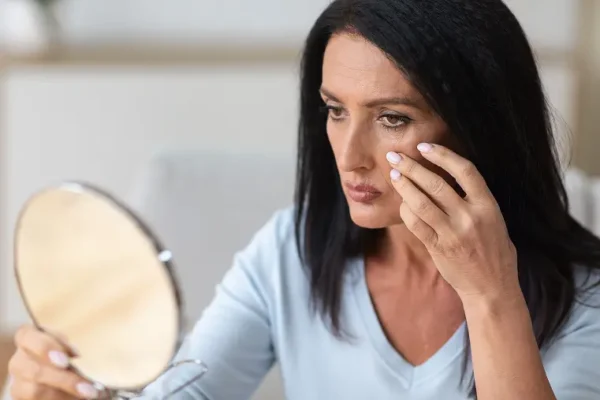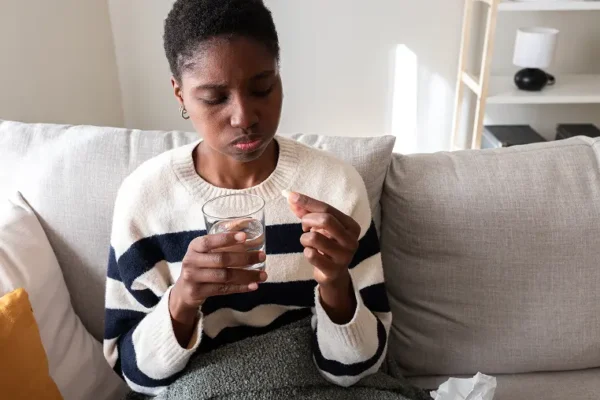10 Weird Symptoms of Low Estrogen
By Ashley Nowe
Published:

Hot flashes, irregular periods, mood swings, and a decreased sex drive. These are among the best-known symptoms of perimenopause, and are linked to decreased estrogen production. But did you know that your itchy ears, a suddenly stinky body odor, or your burning tongue can also be attributed to low estrogen? (Huh.)
Though perfectly normal, these “weird” perimenopause symptoms might seem unexpected. Remember, your body goes through a significant hormonal shift during perimenopause. As your menstrual cycle winds down, it marks the ending of your reproductive years.
Almost all perimenopause signs and symptoms can be attributed to changes in hormone levels, specifically the decline in estrogen. (It always seems to go back to estrogen.) That’s because estrogen interacts with nearly every system in the body.
Knowing this, it makes sense menopausal symptoms are so wide-ranging. Fortunately, even though some of these changes are annoying or uncomfortable, they are mostly treatable.
In no particular order, here are 10 of the lesser-known symptoms of perimenopause and low estrogen:
1. Heart Palpitations
You might feel the sensation of a skipped beat, irregular, or pounding heart even though you’re at rest. This can feel concerning or downright scary, but it generally is normal to experience the occasional heart palpitation.
However, it is important to talk with your provider to rule out heart disease and other cardiovascular issues.
Find some relief:
- Exercise regularly to improve your cardiovascular system.
- Strive to eat a nutritious diet and maintain a healthy weight.
- Hormone replacement therapy (HRT) might be a great treatment option, but there are side effects. Talk with your doctor about your symptoms.
2. Oral Changes
Decreasing estrogen levels can lead to a loss in bone density, which includes your jaw. This could lead to tooth decay or gum disease.
Again, thanks to estrogen, your body also produces less saliva. This can lead to a dry mouth, a metallic taste and changes in the flavor and taste of food and drinks. It can even lead to something called Burning Mouth Syndrome (BMS).
Find some relief:
- While there isn’t a single treatment for oral changes, make sure to practice good oral hygiene and get regular dental checkups.
- Stay hydrated, and suck on ice chips or a hard candy to help with the metallic taste.
- Avoiding acidic and spicy foods can help with burning mouth, as well as avoiding alcohol. BMS symptoms may also come and go, or might last all day. Talk with your dentist or doctor to figure out the best treatment plan for you.
3. Dry Skin, Brittle Nails, and Itchy Ears?
Estrogen maintains healthy skin by supporting the production of collagen and natural oils. It also helps your skin retain moisture. A symptom of low estrogen is dry skin. As estrogen declines, it becomes thinner, and sometimes itchier.
Your mucous membranes, including those in the ear canal, also get drier and itchier, leading to discomfort. (Eyes and vaginas have the same kind of mucous membrane, which explains why they can feel dry, too.)
Find some relief:
- Hydrate, always! Drink plenty of water throughout the day.
- Avoid super hot water in your shower. Slather on a thick moisturizer, cream, or oil afterward. Rub it into your cuticles and nail beds to keep your nails strong. While we’re talking about taking care of our skin, don’t forget sunscreen.
- Try a humidifier to add moisture to the air (especially in winter). This can soothe membranes, like those in the ear, nose, and throat.

4. Body Odor
If you’ve been around a tween or teen in the throes of puberty, you might’ve noticed a certain stink. Similarly, as our hormones shift and estrogen lowers in perimenopause, it’s not unusual for your BO to have a new funk. It doesn’t help if you’re suddenly sweating from a hot flash.
Find some relief:
- Try a different deodorant – your body chemistry may respond better to a stronger ingredient. Or try out a deodorant made with acid (mandelic acid specifically), which works with your body to neutralize odors. Some brands make soaps and body washes with stink-fighting acids, which can be helpful, too.
- Try wearing breathable fabric made of natural fibers (cotton, linen, etc.). This helps maximize evaporation. Try dressing in layers to minimize sweat during a hot flash.
I love using Native body wash because of the clean ingredients and many scent options they have!
5. Incontinence
Many things, from having a baby to obesity, to a weak pelvic floor can lead to incontinence. But what’s happening when you suddenly have difficulty with bladder control during perimenopause? Or you let out a sneeze and leak a bit?
You guessed it: the loss of estrogen. Less estrogen leads to the loss of elasticity of vaginial tissue, vaginal dryness, and weakening pelvic floor muscles.
Find some relief:
- Focus on exercises to help strengthen the pelvic floor.
- Check out Core Basics in the Menovation app to learn more about supporting pelvic health and strengthening the pelvic floor.
- Consider topical estrogen cream to help improve elasticity and help with bladder control.
- Avoid bladder stimulants, like coffee and alcohol.
6. Muscle and Joint Pain or Tingling
Estrogen helps with inflammation and regulates fluid levels. And a decline in estrogen may be why you might notice more joint pain, sore muscles after a workout, or may feel stiffer when you first wake up. In fact, about 70% of women report muscle pain or joint stiffness during perimenopause.
If you notice tingling or numbness, in your hands, feet, arms, or legs, it might be a symptom of menopause known as paresthesia. The feeling typically lasts for a few minutes at a time and typically subsides when estrogen levels settle.
Find some relief:
- Keep moving. Strength training is particularly helpful during and after the menopause transition. Try yoga and stretching to keep limber. You can find a range of supportive workouts and exercises in the Menovation app.
- For tingling, a nutritious diet, regular sleep, and magnesium (especially epsom salt baths) can help.
- Eat a balanced and nutrient-dense diet, including lots of anti-inflammatory foods (e.g. omega-rich fish, nuts, whole grains, leafy greens, and berries).
7. Bloating and Menopause Belly
You wake up feeling confident, and find yourself rocking a pooch by the end of the day. This might be one of the most frustrating parts of perimenopause. (No wonder so many of us prefer workout clothes to hard pants.)
Shifting hormones, a slowing metabolism, and changes in how the body stores fat can all contribute to extra belly fat – aka menopause belly.
Find some relief:
- A balanced diet low in added sugar and salt can help avoid weight gain.
- Regular exercise, especially strength-focused moves that ramp up your metabolism and therefore help with menopause belly.
- Manage stress – consider yoga, meditation, and deep breathing to help with cortisol levels.
8. Anxiety, Panic, and Depression
Mental health is just as important as physical health. Estrogen supports your body’s “feel good” chemicals (serotonin, dopamine, oxytocin, endorphins, etc.). Decreasing estrogen can majorly impact on your mental health.
In perimenopause, people often notice an increase in feelings of anxiety or depression. Perimenopausal women also report experiencing more panic attacks during this time.
https://youtube.com/shorts/SbuYYQdaoUE?feature=share
Find some relief:
- Don’t hesitate to reach out to a mental health professional if you’re feeling depressed, anxious, or just don’t feel like yourself. Therapy is a wonderful tool. Medication may be necessary, and possibly life-changing.
- Address these three essential lifestyle changes: diet, exercise, and sleep. A nutrient-dense, varied diet, along with regular exercise can help regulate your body.
- Talk with your doctor to see if hormone replacement therapy (HRT) makes sense for your situation.

9. Hair Loss (and Hair Growth in Weird Places)
Around half of women report noticeable hair loss in perimenopause. This can be a real downer for some. Thanks, again, to shifting hormones, your hair’s active growth phases slow down. Lower estrogen leads to more androgen – a male hormone that could cause a random chin hair to sprout.
Find some relief:
- A vitamin-rich diet, especially vitamin D and collagen.
- Many oral and topical treatment options, with the active ingredient minoxidil, are available over the counter or by prescription. These can help reduce hair loss, help hair look fuller, and perhaps stimulate new growth.
10. Fatigue
To be fair, probably everyone is exhausted – life is hard! And going through perimenopause while juggling a busy schedule, family, or demanding job is even harder.
It can be hard to know what is “normal” versus perimenopause-related fatigue. But difficulty falling or staying asleep, along with night sweats, are key symptoms of perimenopause. This can lead to feeling tired, sluggish, and blah the next day.
Find some relief:
- Prioritize sleep. Do your best to stick to a bedtime routine, including going to sleep and waking at the same time every day.
- Limit things like caffeine and alcohol before bed
- Incorporate stress-reduction techniques (yoga, meditation) into your life to hopefully help you drift off more easily at night.
- Exercise and maintain a healthy diet.
People talk about common symptoms, but don’t discuss these more unusual perimenopause symptoms enough. Maybe they don’t know it’s tied to this stage of life. But the truth is, many women experience one or more of these symptoms all the time.
So talk about perimenopause or menopause with your doctors and peers. The more open we are about what is happening with our bodies, the less “weird” these symptoms will seem.
How Menovation Can Help
Check out the Menovation app and become empowered during perimenopause and beyond. It features exercises, nutrition plans, and education for improved well-being, reduced symptoms, and inspiring self-care for confidence and vitality. Then tell a friend – we are trying to keep the lines of communication about peri(menopause) open, right?
Did you know that entering menopause takes several years? There are so many factors to consider! Take our Stage of Menopause Quiz to find out what stage you are in!
As always, talk to a doctor or mental health professional about your experience. Don’t hesitate to contact a professional if you need extra support. If you have severe symptoms, want to learn about hormone therapy, or have other health issues, reach out for help.
Ready to feel more in control through perimenopause? The Menovation app is your go-to hub for perimenopause fitness, health tips, and support. Available now in the App Store and Google Play. Start free trial here.
